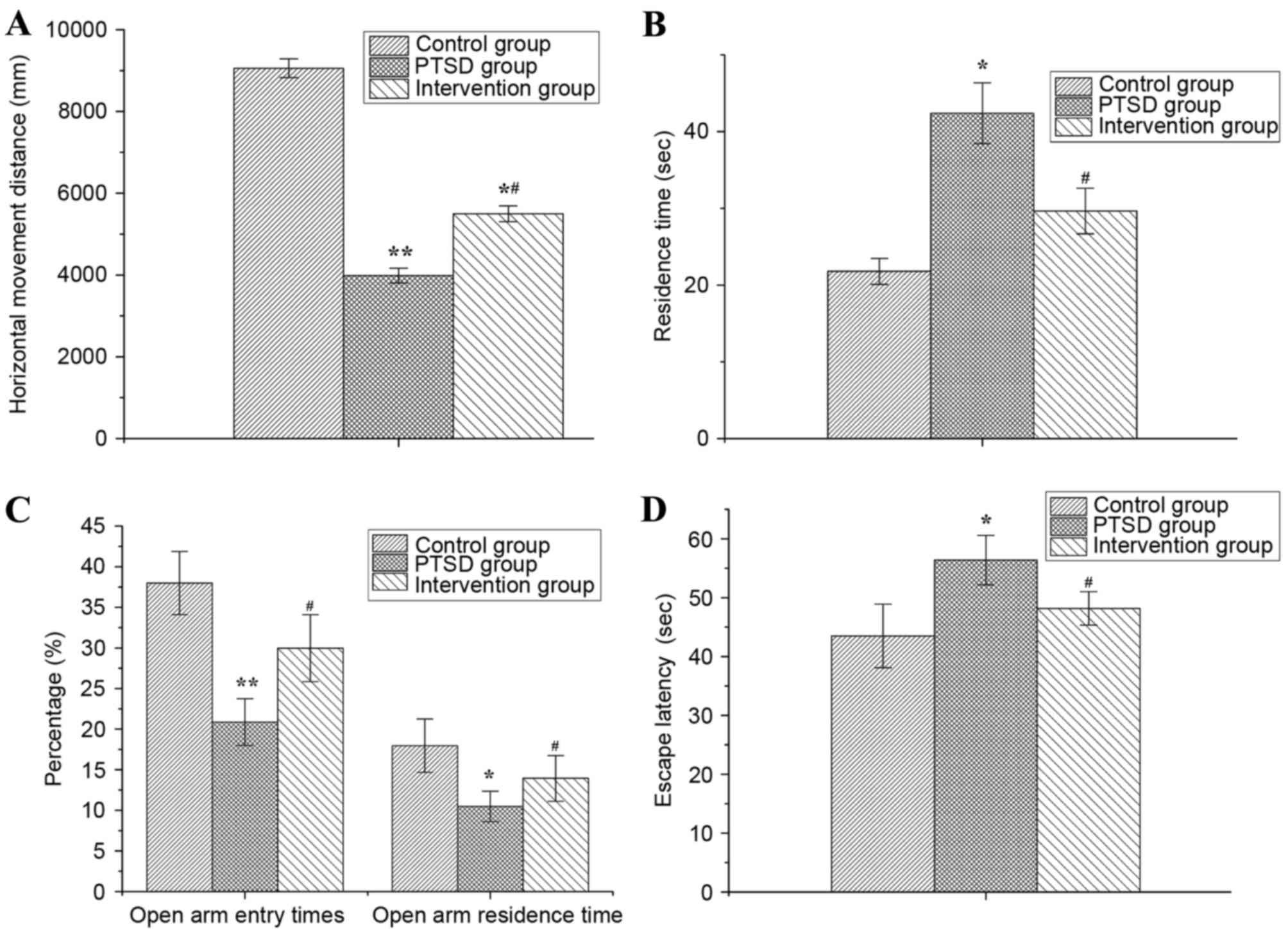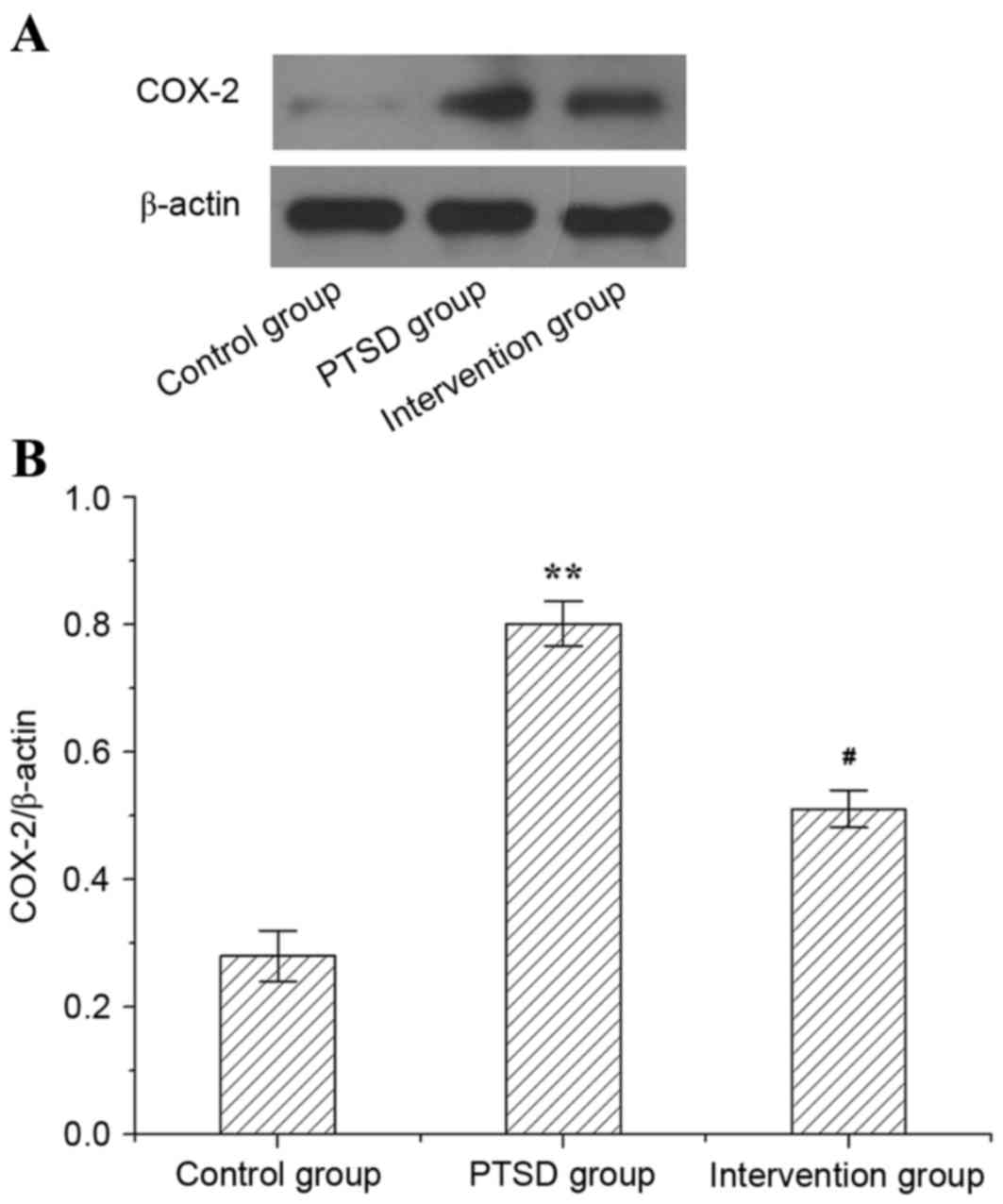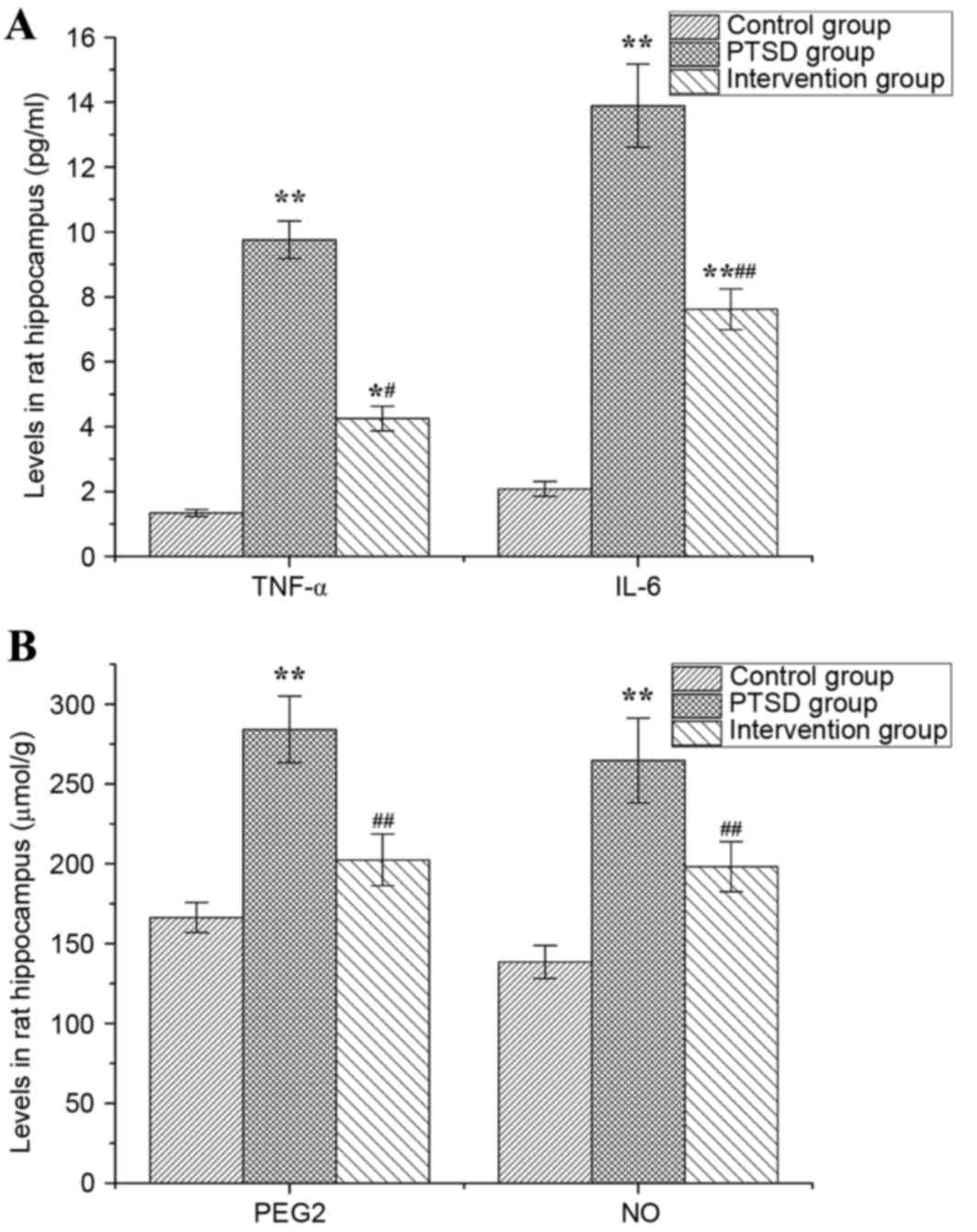|
1
|
Jones KD, Young T and Leppma M: Mild
traumatic brain injury and posttraumatic stress disorder in
returning Iraq and Afghanistan War Veterans: Implications for
assessment and diagnosis. J Counsel Dev. 88:372–376. 2010.
View Article : Google Scholar
|
|
2
|
Olatunji BO, Cisler JM and Tolin DF:
Quality of life in the anxiety disorders: A meta-analytic review.
Clin Psychol Rev. 27:572–581. 2007. View Article : Google Scholar : PubMed/NCBI
|
|
3
|
Pietrzak RH, Goldstein RB, Southwick SM
and Grant BF: Psychiatric comorbidity of full and partial
posttraumatic stress disorder among older adults in the United
States: Results from wave 2 of the National Epidemiologic Survey on
Alcohol and Related Conditions. Am J Geriatr Psychiatry.
20:380–390. 2012. View Article : Google Scholar : PubMed/NCBI
|
|
4
|
Cohen H, Kaplan Z, Koresh O, Matar MA,
Geva AB and Zohar J: Early post-stressor intervention with
propranolol is ineffective in preventing posttraumatic stress
responses in an animal model for PTSD. Eur Neuro Psychopharmacol.
21:230–240. 2011. View Article : Google Scholar
|
|
5
|
Rauch SA, Morales KH, Zubritsky C, Knott K
and Oslin D: Posttraumatic stress, depression, and health among
adults in primary care. Am J Geriatr Psychiatry. 14:316–324. 2006.
View Article : Google Scholar : PubMed/NCBI
|
|
6
|
Knight JA and Taft CT: Assessing
neuropsychological concomitants of trauma and PTSD. Assessing
Psychological Trauma and PTSD. Wilson JP and Keane TM: 2nd. The
Guilford Press; New York, NY: pp. 344–388. 2004
|
|
7
|
Neylan TC, Schadt EE and Yehuda R:
Biomarkers for combat-related PTSD: Focus on molecular networks
from high-dimensional data. Eur J Psychotraumatol. 5:239382014.
View Article : Google Scholar
|
|
8
|
Moeller DR, Duffy JM, Goolsby AM and
Gallimore JT: Use of a removable mandibular neuroprosthesis for the
reduction of posttraumatic stress disorder (PTSD) and mild
traumatic brain injury/PTSD/associated nightmares, headaches, and
sleep disturbances. J Spec Oper Med. 14:64–73. 2014.PubMed/NCBI
|
|
9
|
Mills KL, Teesson M, Ross J and Peters L:
Trauma, PTSD, and substance use disorders: Findings from the
Australian national survey of mental health and well-being. Am J
Psychiatry. 163:652–658. 2006. View Article : Google Scholar : PubMed/NCBI
|
|
10
|
Cohen BE, Marmar CR, Neylan TC, Schiller
NB, Ali S and Whooley MA: Posttraumatic stress disorder and
health-related quality of life in patients with coronary heart
disease: Findings from the heart and soul study. Arch Gen
Psychiatry. 66:1214–1220. 2009. View Article : Google Scholar : PubMed/NCBI
|
|
11
|
Kang HK and Bullman TA: Risk of suicide
among US veterans after returning from the Iraq or Afghanistan war
zones. JAMA. 300:652–653. 2008. View Article : Google Scholar : PubMed/NCBI
|
|
12
|
Nakayama M, Uchimura K, Zhu RL, Nagayama
T, Rose ME, Stetler RA, Isakson PC, Chen J and Graham SH:
Cyclooxygenase-2 inhibition prevents delayed death of CA1
hippocampal neurons following global ischemia. Proc Nati Acad Sci
USA. 95:pp. 10954–10959. 1998; View Article : Google Scholar
|
|
13
|
Rothman SM and Olney JW: Glutamate and the
pathophysiology of hypoxic-ischemic brain damage. Ann Neurol.
19:105–111. 1986. View Article : Google Scholar : PubMed/NCBI
|
|
14
|
Choi DW: Glutamate neurotoxicity and
diseases of the nervous system. Neuron. 1:623–634. 1988. View Article : Google Scholar : PubMed/NCBI
|
|
15
|
Singh DP and Chopra K: Flavocoxid, dual
inhibitor of cyclooxygenase-2 and 5-lipoxygenase, exhibits
neuroprotection in rat model of ischaemic stroke. Pharmacol Biochem
Behav. 120:33–42. 2014. View Article : Google Scholar : PubMed/NCBI
|
|
16
|
Yagami T, Koma H and Yamamoto Y:
Pathophysiological roles of cyclooxygenases and prostaglandins in
the central nervous system. Mol Neurobiol. 53:4754–4771. 2016.
View Article : Google Scholar : PubMed/NCBI
|
|
17
|
Grösch S, Tegeder I, Niederberger E,
Bräutigam L and Geisslinger G: COX-2 independent induction of cell
cycle arrest and apoptosis in colon cancer cells by the selective
COX-2 inhibitor celecoxib. FASEB J. 15:2742–2744. 2001. View Article : Google Scholar : PubMed/NCBI
|
|
18
|
Altorki NK, Keresztes RS, Port JL, Libby
DM, Korst RJ, Flieder DB, Ferrara CA, Yankelevitz DF, Subbaramaiah
K, Pasmantier MW and Dannenberg AJ: Celecoxib, a selective
cyclo-oxygenase-2 inhibitor, enhances the response to preoperative
paclitaxel/carboplatin in early stage lung cancer. J Clin Oncol.
21:2645–2650. 2003. View Article : Google Scholar : PubMed/NCBI
|
|
19
|
Karim A, Tolbert DS, Hunt TL, Hubbard RC,
Harper KM and Geis GS: Celecoxib, a specific COX-2 inhibitor, has
no significant effect on methotrexate pharmacokinetics in patients
with rheumatoid arthritis. J Rheumatol. 26:2539–2543.
1999.PubMed/NCBI
|
|
20
|
Liberzon I, Krstov M and Young EA:
Stress-restress: Effects on ACTH and fast feedback.
Psychoneuroendocrinology. 22:443–453. 1997. View Article : Google Scholar : PubMed/NCBI
|
|
21
|
Liberzon I, López JF, Flagel SB, Vázquez
DM and Young EA: Differential regulation of hippocampal
glucocorticoid receptors mRNA and fast feedback: Relevance to
post-traumatic stress disorder. J Neuroendocrinol. 11:11–17. 1999.
View Article : Google Scholar : PubMed/NCBI
|
|
22
|
Nadeem MN and Maqdoom M: Evaluation of
anticonvulsant effect of celecoxib, a selective cyclooxygenase-2
inhibitor in experimentally induced convulsions in albino rats. Int
J Basic Clin Pharmacol. 5:1466–1470. 2016. View Article : Google Scholar
|
|
23
|
Carola V, D'Olimpio F, Brunamonti E,
Mangia F and Renzi P: Evaluation of the elevated plus-maze and
open-field tests for the assessment of anxiety-related behaviour in
inbred mice. Behav Brain Res. 134:49–57. 2002. View Article : Google Scholar : PubMed/NCBI
|
|
24
|
Brandeis R, Brandys Y and Yehuda S: The
use of the Morris Water Maze in the study of memory and learning.
Int J Neurosci. 48:29–69. 1989. View Article : Google Scholar : PubMed/NCBI
|
|
25
|
Choleris E, Thomas AW, Kavaliers M and
Prato FS: A detailed ethological analysis of the mouse open field
test: Effects of diazepam, chlordiazepoxide and an extremely low
frequency pulsed magnetic field. Neurosci Biobehav Rev. 25:235–260.
2001. View Article : Google Scholar : PubMed/NCBI
|
|
26
|
Walf AA and Frye CA: The use of the
elevated plus maze as an assay of anxiety-related behavior in
rodents. Nat Protoc. 2:322–328. 2007. View Article : Google Scholar : PubMed/NCBI
|
|
27
|
Morris R: Development of a water-maze
procedure for studying spatial learning in the rat. J Neurosci
Methods. 11:47–60. 1984. View Article : Google Scholar : PubMed/NCBI
|
|
28
|
Livak KJ and Schmittgen TD: Analysis of
relative gene expression data using real-time quantitative PCR and
the 2(-Delta Delta C(T)) method. Methods. 25:402–408. 2001.
View Article : Google Scholar : PubMed/NCBI
|
|
29
|
Han Y, Li X, Zhou S, Meng G, Xiao Y, Zhang
W, Wang Z, Xie L, Liu Z, Lu H and Ji Y: 17ß-estradiol antagonizes
the down-regulation of ERα/NOS-3 signaling in vascular endothelial
dysfunction of female diabetic rats. PLoS One. 7:e504022012.
View Article : Google Scholar : PubMed/NCBI
|
|
30
|
Vermetten E, Vythilingam M, Southwick SM,
Charney DS and Bremner JD: Long-term treatment with paroxetine
increases verbal declarative memory and hippocampal volume in
posttraumatic stress disorder. Biol Psychiatry. 54:693–702. 2003.
View Article : Google Scholar : PubMed/NCBI
|
|
31
|
Cisler JM, Bush K, James GA, Smitherman S
and Kilts CD: Decoding the traumatic memory among women with PTSD:
Implications for neurocircuitry models of PTSD and real-time fMRI
neurofeedback. PLoS One. 10:e01347172015. View Article : Google Scholar : PubMed/NCBI
|
|
32
|
Babson KA and Feldner MT: Temporal
relations between sleep problems and both traumatic event exposure
and PTSD: A critical review of the empirical literature. J Anxiety
Disord. 24:1–15. 2010. View Article : Google Scholar : PubMed/NCBI
|
|
33
|
Boals A and Hathaway LM: The importance of
the DSM-IV E and F criteria in self-report assessments of PTSD. J
Anxiety Disord. 24:161–166. 2010. View Article : Google Scholar : PubMed/NCBI
|
|
34
|
Bailey JN, Goenjian AK, Noble EP, Walling
DP, Ritchie T and Goenjian HA: PTSD and dopaminergic genes, DRD2
and DAT, in multigenerational families exposed to the Spitak
earthquake. Psychiatry Res. 178:507–510. 2010. View Article : Google Scholar : PubMed/NCBI
|
|
35
|
Carpenter LL, Gawuga CE, Tyrka AR, Lee JK,
Anderson GM and Price LH: Association between plasma IL-6 response
to acute stress and early-life adversity in healthy adults.
Neuropsychopharmacology. 35:2617–2623. 2010. View Article : Google Scholar : PubMed/NCBI
|
|
36
|
Robinson RA: Molecular clue to PTSD. PLoS
Biol. 13:e10022832015. View Article : Google Scholar : PubMed/NCBI
|
|
37
|
Müller N and Schwarz MJ: The
immune-mediated alteration of serotonin and glutamate: Towards an
integrated view of depression. Mol Psychiatry. 12:988–1000. 2007.
View Article : Google Scholar : PubMed/NCBI
|
|
38
|
Gamble-George JC, Baldi R, Halladay L,
Kocharian A, Hartley N, Silva CG, Roberts H, Haymer A, Marnett LJ,
Holmes A and Patel S: Cyclooxygenase-2 inhibition reduces
stress-induced affective pathology. Elife. 5(pii):
e141372016.PubMed/NCBI
|
|
39
|
Gao HM, Liu B, Zhang W and Hong JS: Novel
anti-inflamatory therapy for Parkinson's disease. Trends Pharmacol
Sci. 24:395–401. 2003. View Article : Google Scholar : PubMed/NCBI
|
|
40
|
Hinz B and Brune K: Cyclooxygenaxe-2-10
years later. J Pharmacol Exp Ther. 300:367–375. 2002. View Article : Google Scholar : PubMed/NCBI
|
|
41
|
Said RS, Badr AM, Nada AS and El-Demerdash
E: Sodium selenite treatment restores long-lasting ovarian damage
induced by irradiation in rats: Impact on oxidative stress and
apoptosis. Reprod Toxicol. 43:85–93. 2014. View Article : Google Scholar : PubMed/NCBI
|
|
42
|
Nury T, Zarrouk A, Vejux A, Doria M,
Riedinger JM, Delage-Mourroux R and Lizard G: Induction of
oxiapoptophagy, a mixed mode of cell death associated with
oxidative stress, apoptosis and autophagy, on
7-ketocholesterol-treated 158n murine oligodendrocytes: Impairment
by α-tocopherol. Biochem Biophys Res Commun. 446:714–719. 2014.
View Article : Google Scholar : PubMed/NCBI
|
|
43
|
Takadera T, Yumoto H, Tozuka Y and
Ohyashiki T: Prostaglandin E(2) induces caspase-dependent apoptosis
in rat cortical cells. Neurosci Lett. 317:61–64. 2002. View Article : Google Scholar : PubMed/NCBI
|
|
44
|
Li RJ, Liu L, Gao W, Song XZ, Bai XL and
Li ZF: Cyclooxygenase-2 blockade inhibits accumulation and function
of myeloid-derived suppressor cells and restores T cell response
after traumatic stress. J Huazhong Univ Sci Technolog Med Sci.
34:234–240. 2014. View Article : Google Scholar : PubMed/NCBI
|
|
45
|
Morioka N, Inoue A, Hanada T, Kumagai K,
Takeda K, Ikoma K, Hide I, Tamura Y, Shiomi H, Dohi T and Nakata Y:
Nitric oxide synergistically potentiates interleukin-1 beta-induced
increase of cyclooxygenase-2 mRNA levels, resulting in the
facilitation of substance P release from primary afferent neurons:
Involvement of cGMP-independent mechanisms. Neuropharmacology.
43:868–876. 2002. View Article : Google Scholar : PubMed/NCBI
|
|
46
|
Puetz TW, Youngstedt SD and Herring MP:
Effects of pharmacotherapy on combat-related PTSD, anxiety, and
depression: A systematic review and meta-regression analysis. PLoS
One. 10:e01265292015. View Article : Google Scholar : PubMed/NCBI
|





















